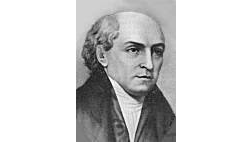When I was a teen, I read a biography of William Carey, an English minister who founded the Baptist Missionary Society and is generally regarded as the father of modern missions, which was entitled “Young Man in a Hurry.” The title was meant to be more of a description of Carey’s passion and determination than a critique of his motives and methods, but, as is usually the case with all of us, Carey’s strengths, resolve and determination, were also his greatest weaknesses, manifesting themselves as stubborness and inflexibility. Whether it was his primary intent or not, the author successfully impressed upon me that Carey too often attempted to move at his pace, rather than at God’s. While he accomplished a great deal, including translating the Scriptures into seven languages, Carey suffered numerous set-backs in his ministry. His first wife was reluctant to accompany him to India and suffered a mental breakdown shortly after arriving, from which she never recovered. He faced opposition from the British East India Company, who controled much of the subcontinent, and lost his print shop to a devestating fire that destroyed not only the Bibles he had printed in several local Indian languages, but also the hand-carved type blocks used to print them. From the biographer’s perspective, these experiences were God’s way of slowing Carey down. As a result, while I admired Carey’s ambition and persistence, I vowed I would never become a young man in a hurry.
Therefore, when I enrolled in Bible college with the express intention of becoming a missionary to Italy, I made sure to caveat my ambition by telling people that “if I don’t get to Italy myself, I’ll be actively involved in sending others.” It wasn’t a hollow promise — it was just one I never expected to have to keep.
You see, I was the quintessential missionary candidate for Italy. My parents became chruch-planting missionaries in Italy when I was 11. I was fluent in the language, having attended and earned top grades in Italian schools. I had teaching and preaching gifts which I had already demonstrated and were recognized by others. I had a pedigree of full-time Christian service going back two generations on both sides of my family tree. More than anything else, I was motivated — extremely motivated. Anyone who couldn’t see that I had been created for precisely this was blind, deaf, and dumb — in the “stupid” sense of the word. When I met and married a girl who was equally ready and willing to become a missionary to Italy, what had been set in concrete became cast iron. Who needed a sign? Moses and Gideon were schmoes — there was no need to tell me twice what to do. With the “if” already settled, the “when” became simply a matter of time; and you know what they say — there’s no time like the present.
I’m sure you’ve recognized by this point that I went running full tilt in the direction of the mission field without any regard for God’s timing, and became the young man in a hurry I swore I would never be. In my defense, I didn’t think I was acting in haste — I just thought I was doing what I was supposed to do, and every obstacle which came across my path was simply intended to test my faith and prove my resolve. In retrospect, I can’t tell you how much faith I really had, but there was no doubt I had plenty of resolve.
As you’ve undoubtably inferred, the Lord stopped me. Shut me down completely, actually. I had built up such a head of steam, and had so consistently ignored the warning signs to slow down that when I hit the wall, I hit it hard. He didn’t say much of anything to me. Instead, He just let me sit there for a while, leaving me dazed and confused.
When I regained some spiritual consciousness several months later, I found myself watching Him move others into their chosen fields of service right in front of my face. Their dreams were blossoming and taking shape, while everything I had dreamt for lay in a pile of clay dust. In my jealousy, I demanded satisfaction. “OK, Lord,” I said, “if not now, when?”
“Good question,” He replied. “I’m thinking … never. How does that sound?”
What little fortitude I had left at that point vaporized. I had become worse than Carey — I hadn’t just been in a hurry, I had been wrong. Finding my purpose in life (or what I thought it was) destroyed, I stopped living, and started existing. But it was a miserable existence. I never got to the point where I hated missions, but I surely hated missions conferences. I tried to tell myself I wasn’t jealous of those entering the mission field, but even having to look at their faces was salt in a wound which seemed would never heal.
Slowly, but surely, the Master Potter took the pile of clay dust, and started refashioning it. He started by establishing a foundational operating principle of our new relationship: a servant does not get to dictate the terms of his service. To dive home His point, the only piece of the old dream He kept was the promise I thought I would never have to keep — to support others He had permitted to go. By enabling me to give to others, He’s faithfully shown me that where or how you’re serving isn’t what makes service fulfilling — it’s serving Him where and how He wants you to that makes it fulfilling.


